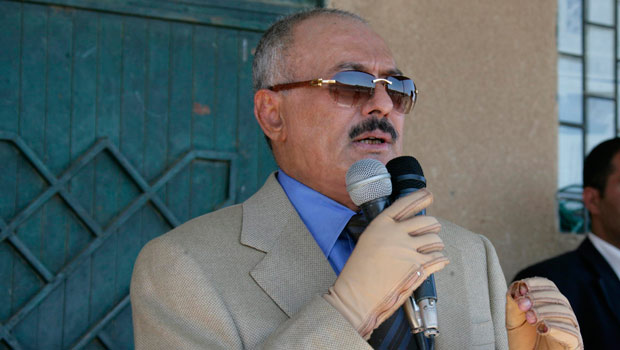It was the fourth attempt to wrap up a power transfer accord that Saleh backed out of at the last minute on three previous occasions, fueling turmoil that has bolstered Al-Qaeda militants next door to the Kingdom, the world’s No. 1 oil producer.
Activists who have entrenched themselves in a central Sanaa square saw the deal as a ruse and demanded that Saleh end his 33 years of rule now. Government troops skirmished with gunmen loyal to a powerful opposition tribal leader in the capital.
“The president ... arrived this morning in Riyadh on a visit to the Kingdom of Saudi Arabia, following an invitation from the Saudi leadership, to attend the signing of the Gulf initiative and its operational mechanism,” state news agency Saba said.
The development came after UN envoy Jamal Benomar, with support from US and European diplomats, managed to devise a compromise to implement the power transfer deal crafted by the six-member Gulf Cooperation Council.
Under the GCC plan, Saleh would shift all his powers to his deputy, Abd-Rabbu Mansour Hadi, who would form a new government with the opposition and call for an early presidential election within three months.
Saleh would keep his title until a successor is elected.
“The accord gives the vice president the power to implement the Gulf initiative,” Benomar told a news conference in Sanaa before he boarded a plane to Riyadh along with Yemeni government officials and opposition leaders to attend the signing ceremony.
Benomar had said on Tuesday that details of the signing of the accord — a stage at which it has fallen apart before — were being hammered out, after an agreement in principle.
A Yemeni official had said on Tuesday that the accord was facing opposition from some senior politicians in Saleh’s General People’s Congress (GPC).
In a sign of lingering skepticism that the deal was really done, diplomats and opposition officials said GCC Secretary-General, Abdul Latif Al-Zayyani, had refused to fly to Sanaa for the signing ceremony, whereupon Saleh flew to the Kingdom. Officials said Zayyani had been embarrassed before when Saleh kept dignitaries in suspense before refusing to sign the accord.
Benomar said a national dialogue would be held during a two-year transitional period culminating in a constitutional review.
“Once the agreement is signed, it will mark an important step for the people of Yemen in resolving the political crisis and moving their country forward toward a better future.”
Yemeni officials said Hadi was also in Riyadh for the ceremony and that opposition leaders were due to fly to Riyadh later on Wednesday.
Months of protests have rekindled conflicts with Yemen’s Islamist militants and separatists, threatening anarchy in a country Washington regards as a front line against Al-Qaeda.
In downtown Sanaa, activists set fire to a large poster of Saleh and danced around it in a frenzy.
“This agreement comes from within inside the regime,” said Abdul Rahim, a 27-year-old English teacher and human rights activist. “It does not address our demands,” he added.
But Samia Al-Aghbari, another activist, said the accord spares Yemen a devastating war. “We will remain on the streets until our demands are met,” she told Reuters. “Saleh’s crimes won’t end with time, so we will pursue him and all the killers.”
A Yemeni official said that renegade general Ali Mohsen, who broke away from the Yemeni army after protests began in February, and Al-Ahmar, who are not part of the accord, may try to obstruct the deal.
Those figures, along with Saleh’s son and a nephew who commands a key paramilitary unit, form a balance of forces on the ground that analysts say none is likely to tip, making a political resolution the only way out of Yemen’s deadlock.
Saba said Saleh had received a telephone call from UN Secretary-General Ban Ki-moon on Tuesday to thank him “for his efforts to extract Yemen out of the crisis in a peaceful way.”
Saleh was forced to seek treatment in Riyadh for injuries suffered in an apparent assassination attempt in June after the last time he ducked out of the deal, which ushered in street battles that devastated parts of his capital Sanaa.
Witnesses said Ahmar fighters and Saleh forces traded shelling in the Soufan and Al-Hasaba neighborhoods in Sanaa, where the tribal chief lives, and that sounds of explosions could be heard from a distance.
There were no reports of casualties. The area was the scene of heavy clashes earlier this year, where scores of people from both sides died.









